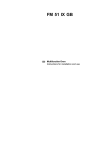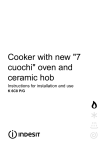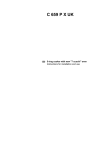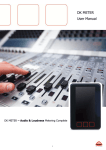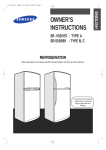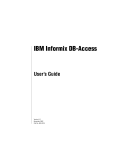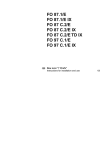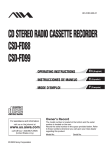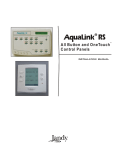Download Ariston 7 Cuochi Instruction manual
Transcript
User Instruction Book for ARISTON COOKER Model FD88 19502178404 Ariston Digital Ariston Digital is the new generation of electric household appliances that are completely contrived to link up with each other and with the Merloni Elettrodomestici Digital Service Centre. Services on offer This possibility to interact with one another enables these electric household appliances to make the most of the new services that Merloni Elettrodomestici have on offer, which are: The household network The electric household appliances and accessories in the Ariston Digital line of products use WRAP technology (Web Ready Appliances Protocol) to produce a series of information as to their operation and to exchange them using standard communication systems: this means that the appliance you have just bought is designed to interact with the other components in the Ariston Digital system, using the electricity network, with the addition of a suitable accessory. Consequently, it is not necessary to connect any additional cables and each new Ariston Digital electric household appliance plugged into a socket automatically becomes part of your household network. Consumption Management. The electric household appliances can communicate with one another as well as with some of the accessories from the Ariston Digital line (Current Gauge and Digital Adapter) in order to control consumption levels within your home and to avoid the risk of an electrical power failure due to overloading. Remote Assistance. Thanks to the TeleLink accessory in the Ariston Digital line, the electric household appliances can also communicate with the Digital Service Centre in order to report malfunctions immediately and to anticipate any problems. Ariston Digital is a new line of electric household appliances, accessories and services designed for your safety and that of your home. For further information, please call us on the freephone number : 800-448844, or send us an e-mail at: ‘[email protected]’ or why not visit our website at: www.aristonchannel.com 12 Congratulations on choosing an Ariston appliance, which you will find is dependable and easy to use. We recommend that you read this manual for best performance and to extend the life of your appliance. Thank you. Close-up View A D 5 5 H G B C F 13 12 11 10 9 250 MAX 200 PIZZA 150 100 40 MIN D 5 6 7 8 5 1 B 3 2 C 1. Start - pause - stop cooking / oven light - language selection 2. Cooking time selection / clock 3. End cooking time selection/ display panel brightness / control panel lock 5. Mode description 6. Mode number 7. Cooking time 8. Cooking over 9. Graduated temperature scale 10.Energy percentage for grilling modes 11.Time or temperature 12.Clock display 13.Electric elements in use A. B. C. D. Control Panel Knob for selecting cooking mode Knob for selecting cooking temperature Electronic Display Panel- displays the selected features, the correct time and allows you to programme the desired cooking mode by selecting the cooking time and the end cooking time. F. Dripping Pan or Baking Sheet G. Oven Rack H. Guides for sliding the racks or dripping pan in and out 13 How To Use Your Appliance General features The oven combines the advantages of traditional convection ovens with those of the more modern forced air ventilation models. It is an extremely versatile appliance that allows you to choose easily and safely between 7 different cooking modes. The various features offered by the "7 Cuochi" oven are selected by means of the "B" selector knob and the "C" temperature knob on the control panel. The odour that is often detected during this initial use is due to the evaporation of substances used to protect the oven during storage and until its installation. Cooking Mode Description The cooking modes are selected by turning knob "B". 1. Convection Mode Position of the "C" temperature knob: between 50°C and 250°C. The outer heating elements at both the top and the bottom of the oven will come on. The heat is thus distributed uniformly from the top to the bottom. The convection mode is recommended for preparing meat-based dishes featuring beef or veal which need to cook slowly and require basting or the addition of liquid. It remains the best system for cooking pastries as well as fruit, in general. When cooking in convection mode, only use one dripping pan or cooking rack at a time, otherwise the heat distribution will be uneven. Select from among the various rack heights based on whether the dish needs more or less heat from the top. The Clock When the appliance is switched off, the panel displays the correct time. To reset the time, press button "2" and turn knob "C". Important: the appliance is equipped with a diagnostic device which can detect any malfunctions. The user will be informed of any such malfunctions by “F nn”-type messages (nn= number made up of 2 figures). This means that the appliance is out of order and that technical assistance is necessary. Selecting the Language When the appliance has been switched off, press button "1" for a few seconds. The various languages available will appear in sequence on the display panel. Press button "1" again to select the desired language. 2. Pizza Mode Position of the “C” temperature knob: between 50°C and 250°C. The bottom and circular heating elements, as well as the fan, will come on. This combination rapidly heats the oven due to the large amounts of power used by the appliance (2800-2900 W), which results in the production of considerable heat coming prevalently from the bottom. The pizza mode is ideal for foods requiring high temperatures to cook, like pizzas and large roasts. Only use one dripping pan or rack at a time. However, if more than one is used, these must be switched halfway through the cooking process. Selecting the Display Panel Brightness When the appliance has been switched off, press button "3". Turn knob "C" clockwise/anticlockwise to increase/ decrease the brightness of the display panel. A few seconds after this selection, the oven will be ready for further instructions. Locking and Unlocking the Control Panel This option enables the user to lock all the buttons and knobs. We especially advise you to use this option if there are children present. To activate the locking device, press button "3" for a few seconds. The term "LOCKED" will appear on the display panel. To restore the usual commands to the appliance, just press button "3" again for a few seconds. The term "UNLOCKED" will appear on the display panel. 3. Ventilation Mode Position of the “C” temperature knob: between 50°C and 250°C. Both the top and bottom outer heating elements, as well as the circular heating elements will come on. Since the heat remains constant and uniform throughout the oven, the air cooks and browns food uniformly over its entire surface. With this mode, you can also cook various dishes at the same time, as long as their respective cooking temperatures are the same. A maximum of 3 racks can be used at the same time, following the instructions in the section entitled: "Cooking On More Than One Rack". This cooking mode is ideal for au gratin dishes or those which require an extended cooking time.The excellent heat distribution makes it possible to use lower temperatures when cooking roasts. This results in less loss of juices, meat which is more tender and a decrease in the loss of weight of the roast. The ventilated mode is especially suited for cooking fish, which can be prepared with the addition of a limited amount of condiments, thus maintaining their flavour and appearance. This mode can also be used to thaw red or white meat, fish and bread, by setting the temperature to 80°-100°C. To thaw more delicate foods, set the thermostat to 60°C. How To Use Your Oven Turn knob "B", and the panel will display the description of the selected function and the correct time will be replaced by the proposed temperature, which can be altered simply by turning knob "C". To start cooking, just press button "1" . If there is nothing in the oven, it will automatically switch itself off 10 minutes after the last directions were entered onto the control panel. Cooking can be temporarily interrupted by pressing button "1" (the term "PAUSE" will appear on the display panel). Cooking will start again automatically 30 seconds after the last directions were entered onto the control panel or by pressing button "1" again.To interrupt cooking for good, press button "1" for a few seconds or turn knob "B" anticlockwise until the term "OFF" appears on the display panel. Important: The first time you use your appliance, we recommend that you set the thermostat to the highest setting and leave the oven on for about half an hour with nothing in it. Then open the oven door and let the room air. 14 This helps prevent food from burning on the surface, allowing the heat to penetrate right into the food. 4. Pastry Mode Position of the “C” temperature knob: between 50°C and 250°C. The fan will start and both the top and the bottom heating elements will come on. This provides a delicate cooking process with a prevalence of heat from the bottom. This mode is ideal for baking and cooking delicate foods especially cakes that need to rise. Oven Light When the appliance has been switched off, turn the oven light on by pressing button "1". To turn it off, press the same button again. The light illuminates the oven and remains on for the duration of the entire cooking time. If there is nothing in the oven, it will switch itself off automatically 10 minutes after the last directions were entered onto the control panel. 5. Grill Position of the “C” knob: between 40% and 100%. The central heating element of the grill will come on. This incandescent heating element cooks food by means of thermal radiation directed downwards. The extremely high and direct temperature of the grill makes it possible to brown the surface of meats and roasts while locking in the juices to keep them tender. Forced Air Ventilation In order to reduce the external temperature of the oven, this appliance has been equipped with a cooling fan which stays on during the cooking process. A normal flow of air can be heard exiting between the oven door and the control panel. When cooking is over, the fan remains on for a few minutes, in order to enable the oven to cool down quickly. If there is a cooktop above the oven, the cooling fan may switch itself on automatically to protect the electronic components, even if the appliance has been switched off. Note: In the event of a power failure, the oven will memorize the reached cooking stage in such a way that it can recommence from the very point at which it had stopped cooking, as soon as the power supply has been re-established. 6. Double Grill Position of the “C” knob: between 40% and 100%. Both heating elements of the grill will come on. This grill is larger than other grills and has a completely new design, which increases the cooking efficiency, thus browning the entire food surface uniformly. 7. Ventilated Double Grill Position of the “C” temeprature knob: between 100°C and 250°C. Both heating elements of the grill will come on, as well as the fan. This mode increases the effectiveness of the unidirectional thermal radiation of the heating elements through forced circulation of the air throughout the oven. Warning Do not place cookware on the bottom of the oven because this will result in uneven cooking and the curved surface of the bottom would not provide a stable support surface. Programming the cooking mode display panel will feature the end cooking time obtained by adding the current time to the previously selected cooking time, as well as the time necessary for the oven to preheat (automatically calculated by the appliance according to the cooking mode selected). Turn knob "C" until the display panel features the time you want the food to be ready. • press button "1" to set the programme. After these selection procedures, the display panel will feature the time at which preheating will commence, and that at which cooking will be over. The latter can be altered up until the cooking mode and temperature reappear on the display panel. Any incorrect data can be corrected simply by repeating the instructions stated above. To alter any entries after the cooking mode has been programmed, press button "1" for a few seconds. The data which was previously entered will appear on the display panel. This data can be altered by following the instructions above. 5 B 1 2 3 C The display panel has a dual purpose: giving the correct time, and programming the cooking mode. Cooking programmer To programme the cooking mode,follow the instructions below: • select the cooking mode by turning knob "B", and the temperature by turning knob "C". • select cooking time by pressing button "2". The length of cooking time will appear on the display panel, and it can be altered by turning knob "C" until the desired cooking time comes up. The selected cooking time does not include the time required for preheating the oven. • select end cooking time by pressing button "3". The To cancel a cooking mode which has already been programmed To cancel any programme which has been entered, turn knob "B" anticlockwise until the term "OFF" appears on the display panel. 15 How to Keep Your Oven in Shape Before cleaning your oven, or performing maintenance, disconnect it from the power supply. To extend the life of your oven, it must be cleaned frequently, keeping in mind that: • The self-cleaning panels (if present) and the enameled parts should be washed with warm water - abrasive powders and corrosive substances should be avoided; • The inside of the oven should be cleaned immediately after use with warm water and soap; the soap should be rinsed away and the interior dried thoroughly; • Stainless steel can be stained if it remains in contact with agressive detergents (containing phosphorus) or water with a high lime content. We recommend that you rinse these parts thoroughly and dry them well after cleaning. It is also a good idea to dry any water spills. Replacing the Lamp in the Oven • Cut off the supply of power to the oven by turning off the omnipolar switch connecting it to the mains, or by removing the plug if it is accessible; • Unscrew the glass cover attached to the lamp holder; • Unscrew the lamp and replace it with another hightemperature lamp (300 ° C) with the following characteristics: - Voltage: 230/240 V - Wattage: 25W - Socket: E14 • Remount the glass cover and reconnect the appliance to the power supply. Practical Cooking Advice Preheating With the exception of the “5. Grill The “7. Double Ventilated Grill ” Cooking Mode is extremely useful for grilling food rapidly. Not only does it brown the surface, but it also cooks the bottom part. For example, it is ideal for browning pasta bakes. Important: always use the grill with the oven door closed. This will allow you both to attain excellent results and to save energy (about 10%). To obtain the best results when using any of the three grilling modes turn knob "C" to 100%. If necessary, however, the thermostat can be set to lower temperatures by simply turning knob "C" to the energy percentage required. To prevent fat and grease from dripping onto the bottom of the oven, place the dripping pan beneath the rack used for grilling. ” and “6. Double Grill ” functions, which do not require any preheating, this phase is carried out automatically by the appliance, which sets the length of time for preheating based on the temperature selected by the user. The time that should elapse before the cooking phase begins will appear on the display. Cooking on More Than One Rack If you have to cook on 2 racks, just use Cooking Mode "3. Ventilation ” , which is the only one appropriate for this type of cooking. Use the second, third and fourth rack from the bottom, as the bottom one receives too much direct heat, which could burn more delicate foods. If three racks are used at the same time, switch the third and fourth racks halfway through cooking. Baking pastries Do not open the door while the pastry is cooking, in order to prevent it from dropping. Batters must not be too runny, as this will resut in prolonged cooking times. In general: Using the grill The oven offers you three different grilling modes. Pastry is too dry Use Cooking Mode "5. Grill ” for small portions (toasted snadwiches, hotdogs etc...): the electrical consumption is then a mere 1200 W. Position the food under the centre of the grill, as only the central part of the top heating element is in use. Increase the temperature by 10°C and reduce the cooking time. Pastry dropped Use less liquid or lower the temperature by 10°C. The “6. Double Grill ” Cooking Mode allows you to grill along the entire surface area of the grill. Use this cooking mode when you have food distributed evenly throughout the oven and you would like to brown it uniformly. 16 Cooking Fish and Meat The meat must weigh at least 1 KG in order to prevent it from drying out. When cooking white meat, fowl and fish, use low temperature settings (150°C-175°C). For red meat that should be well done on the outside while tender and juicy on the inside, it is a good idea to start with a high temperature setting (200°C-220°C) for a short time, then turn the oven down afterwards. In general, the larger the roast, the lower the temperature setting. Place the meat on the centre of the rack and place the dripping pan beneath it to catch the fat. Make sure that the rack is inserted so that it is in the centre of the oven. If you would like to increase the amount of heat from below, use the lower rack heights. For savoury roasts (especially duck and wild game), dress the meat with lard or bacon on the top. Pastry is too dark on top Place it on a lower rack, lower the temperature, and increase the cooking time. Cooked well on the inside but sticky on the outside Use less liquid, lower the temperature, and increase the cooking time. The pastry sticks to the pan Grease the pan well and sprinkle it with a dusting of flour. I used more than one level and they are not all at the same cooking point Use a lower temperature setting. It is not necessary to remove the food from all the racks at the same time. Cooking pizza For best results when cooking pizza, use the "2. Pizza • • • • ” Cooking Mode: Use a light aluminium pizza pan, placing it on the broiler supplied with the oven. If the dripping pan is used, this will extend cooking times, making it difficult to get a crispy crust. Do not open the oven door frequently while the pizza is cooking. If the pizza has a lot of toppings (three or four), it is recommended that the mozzarella cheese be placed on top halfway through the cooking process. If cooking on more than one rack (up to 3), we advise you to use the "3. Ventilation " Cooking Mode, as the "2. Pizza " Cooking Mode would heat the bottom rack more than the others. 17 Selection Knob Setting Type of Food Wt. (Kg) Rack Position From Oven Bottom Preheating Time (minutes) Thermostat Knob Setting Cooking Time (minutes) 1 Convection Mode Duck Roast beef Roast pork Biscuits 1 1 1 - 3 3 3 3 10 10 10 8 200 200 200 160 65-75 70-75 70-80 10-15 2 Pizza Mode Pizza Roast beef Chicken 0,5 1 1 3 3 2-3 10 9 8 220 200 180 15-20 45-55 60-70 3 Ventilation Mode Pizza (on 2 racks) 1 Lasagne 1,5 Pasta au gratin 1 Lamb 1 Chicken+Potatoes (on 2 racks) 1+0,5 Sea bream, in portions 1,5 Chocolate cake 1 Puff pastry 0,6 Roast beef 1 Quiche Lorraine 1 2-4 3 3 2 12 10 9 9 230 200 180 180 15-20 35-40 20-30 40-45 2-4 2 3 2 3 2 10 9 8 10 13 10 200 180 160 200 240 200 60-65 35-40 35-40 18-20 20-25 20-25 0,5 0,7 1,2 0,4 2 3 2 3 10 9 9 9 190 180 180 170 13-15 20-25 40 25-30 1 4 5 100 % 8 1 1 1 4 4 3-4 5 5 5 100 % 100 % 100 % 4 10 8-10 4 Pastry Mode Tarts Doughnuts Plum cake Victoria sponge cake 5 Grill Mode Sole and squid Calamari and shrimp Kabobs Cod fillets Grilled vegetables 6 Double Grill Mode Veal steaks Chops Hamburgers Mackerel 1 1,5 1 1 4 4 3 4 5 5 5 5 100 % 100 % 100 % 100 % 10-15 10-20 7 10-15 7 Ventilated Double Grill Mode Grilled chicken Stuffed cuttle-fish 1,5 1,5 2 2 9 9 200 200 55-60 35-40 NB: cooking times are approximate and may vary according to personal taste. Safety Is A Good Habit To Get Into To maintain the EFFICIENCY and SAFETY of this appliance, we recommend that you do the following: • only call the Service Centres authorized by the manufacturer • always use original Spare Parts • • • - This appliance is designed for non-professional, household use and its functions must not be changed. These instructions are only valid for the countries whose symbols appear on the manual and the serial number plate. The electrical system of this appliance can only be used safely when it is correctly connected to an efficient earthing system in compliance with current safety standards. - Packaging (bags, polystyrene, nails, etc.); The appliance itself, immediately after use of the oven or grill due to the heat generated; The appliance itself, when no longer in use (potentially dangerous parts must be made safe). Avoid the following: - Touching the appliance with wet parts of the body; - Using the appliance when barefoot; - Pulling on the appliance or the supply cord to unplug it from the electrical outlet; - Obstructing the ventilation or heat dissipation slots; - Allowing power supply cords for small appliances to come The following items are potentially dangerous, and therefore appropriate measures must be taken to prevent children and the disabled from coming into contact with them: - Controls and the appliance in general; 18 - into contact with the hot parts of the appliance; Exposing the appliance to atmospheric agents such as rain,or sunlight; Using the oven for storage purposes; Using flammable liquids near the appliance; Using adaptors, multiple sockets and/or extension cords; Attempting to install or repair the appliance without the assistance of qualified personnel. - If the appliance breaks down or functions poorly; ask for original spare parts. It is a good idea to do the following: - Only use the appliance to cook food and nothing else; - Check the soundness of the appliance after it has been unpacked; - Disconnect the appliance from the electrical mains if it is not functioning properly and before cleaning or performing maintenance; - When the appliance is not used for an extended period of time, cut off the supply of power and close the gas cock (if present); - Use oven gloves to place cookware in the oven or when removing it; - Cut the power supply cord after disconnecting it from the mains when you decide not to use the appliance any longer. - The manufacturer will not be held responsible for any damages that might arise from incorrect installation or improper, incorrect or unreasonable use of the appliance. Qualified personnel must be contacted in the following cases: - Installation (following the manufacturer's instructions); - When in doubt about operating the appliance; - Replacing the electrical outlet when it is not compatible with the plug for the appliance. Service Centres authorized by the manufacturer must be contacted in the following cases: - If in doubt about the soundness of the appliance after removing it from the packaging; - If the power supply cord has been damaged or needs to be replaced; Installation m. 45 m . min mm 45 . mm . n mi 595 m. 558 mm . 595 543 . 543 mm . 20 mm In order to ensure adequate ventilation, the back panel of the cabinet unit must be removed. Installing the oven so that it rests on two strips of wood is preferable. If the oven rests on a continuous, flat surface, there must be an aperture of at least 45 x 560 mm. . mm . mm . 5 mm. 567 mm. 595 mm. 45 m 593 mm. 23 mm. 5 mm. . 595 mm. 558 567 mm. 595 mm. 23 mm. Installation of Built-in Ovens In order to ensure that the built-in appliance functions properly, the cabinet containing it must be appropriate. The figure below gives the dimensions of the cutout for installation under the counter or in a wall cabinet unit. 575-585 mm. Important: The power supply to the appliance must be cut off before any adjustments or maintenance work is done on it. mm . 20 mm . 560 mm 45 m m. To fasten the oven to the cabinet, open the door of the oven and attach it by inserting the 4 wooden screws into the 4 holes located on the perimeter of the frame. 19 The panels of the adjacent cabinets must be made of heat-resistant material. In particular, cabinets with a veneer exterior must be assembled with glues which can withstand temperatures of up to 100°C. In compliance with current safety standards, contact with the electrical parts of the oven must not be possible once it has been installed. All parts which ensure the safe operation of the appliance must be removable only with the aid of a tool. Attaching the Power Supply Cable to the Mains The appliance must be connected directly to the mains by means of an omnipolar switch with a minimum contact break of 3 mm, sized for the load and in compliance with the current safety standards (the earthing wire must not be interrupted by the switch). The power supply cord must be positioned so that it does not reach a temperature 50°C above room temperature at any one point along its length. Before making the connection, check that: • the fuse and the electrical system in the home can handle the load of the appliance (see the data plate); • the electrical mains in the home is equipped with an efficient grounding system in compliance with the current safety standards; • The electrical outlet or omnipolar switch is within easy reach when the oven is installed. NB: Do not use adaptors, shunts or reducing devices as they may cause overheating and lead to fires. Electrical Connection Those ovens equipped with a three-pole power supply cord are designed to operate with an alternating current with the voltage and frequency indicated on the data plate (located on the appliance) and in the instruction manual. The wire for grounding the appliance is yellow-green in colour. Mounting a Power Supply Cable Opening the terminal board: V • Remove the "V" screw; • Pull open the cover of the terminal board. To install the cable, proceed as follows: • Remove the wire clamp screw and the three contact screws L-N• Fasten the wires beneath the screwheads using the following colour scheme : Blue (N) Brown (L) YellowGreen • Fasten the suppy cable in place with the clamp, close the cover of the terminal box and fasten it with the "V" screw. 20 Technical Specifications Inner Dimensions of the Oven: Width - 39,5 cm Depth - 39 cm Height- 34 cm This appliance complies with the following European Economic Community safety regulations: Inner Volume of the Oven: 51 Litres - 73/23/EEC of 19/02/73 (Low Voltage) and subsequent modifications; 230V / 50Hz - 89/336/EEC of 03/05/89 (Electromagnetic Compatibility) and subsequent modifications; 2950 W - 93/68/EEC of 22/07/93 and subsequent modifications. Voltage and Frequency of Power Supply: Maximum power absorbed Maximum Consumption (refers to safety standard CENELEC HD 376): Consumption (kWh) To reach a temperature of 180°C+Rt 0,5 To maintain a temperature of 180°C+Rt for an hour 0,9 Total consumption: 1,4 kWh Rt = Room temperature 21











